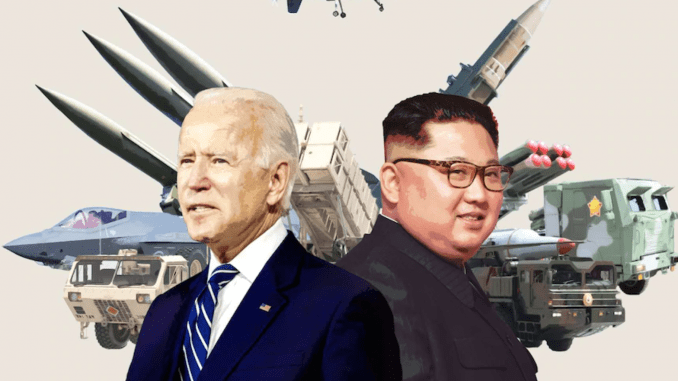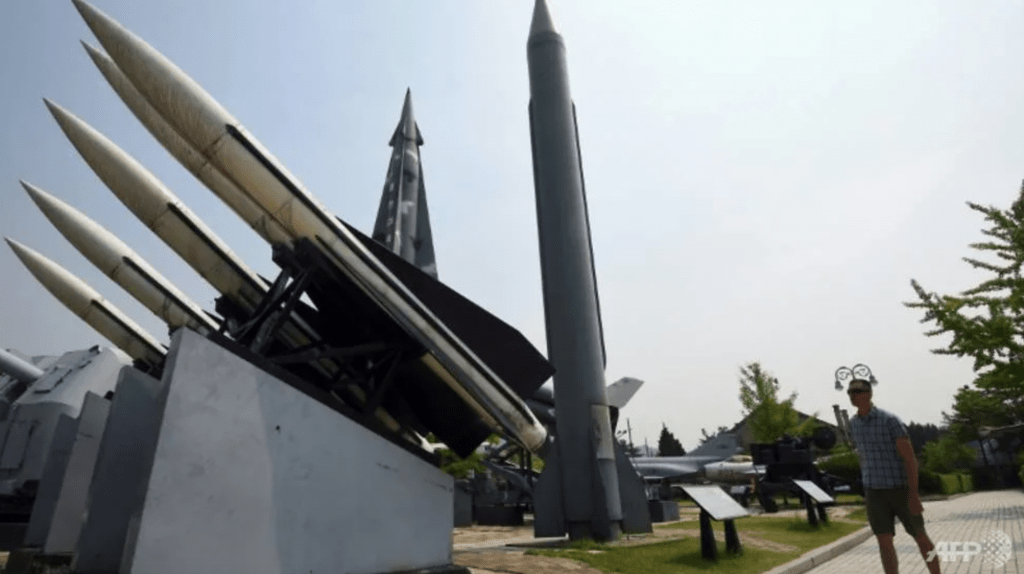
SEOUL/TOKYO – North Korea launched two ballistic missiles into the sea near Japan on Thursday, Japan’s prime minister said, fueling tension ahead of the Tokyo Olympics and ramping up pressure on the Biden administration as it finalises its North Korea policy.
The missile launches highlight the threat North Korea’s illicit weapons programme poses to its neighbours and the international community, the United States military’s Indo-Pacific Command said in a statement.
The command said it was monitoring the situation and consulting allies.
Japan lodged a formal protest through its embassy in China and said the test threatened peace and safety in the region, while South Korea’s National Security Council expressed deep concern.
Japan’s coastguard said the first missile was detected soon after 7 a.m. and flew about 420 km (260 miles), followed by a second 20 minutes later that flew about 430 km (270 miles), indicating the missiles were short-range weapons.
North Korea has previously test-fired missiles over Japan that were able to carry nuclear warheads and reach anywhere in the United States.

“The first launch in just less than a year represents a threat to peace and stability in Japan and the region and violates U.N. resolutions,” Japanese Prime Minister Yoshihide Suga said in comments aired by public broadcaster NHK.
The launches coincided with the start of the Olympic torch relay in Japan on Thursday, beginning a four-month countdown to the summer Games in Tokyo which were delayed from 2020 because of the coronavirus.
Suga said he would ensure a safe and secure Olympics and “thoroughly discuss” North Korea issues, including the launches, with U.S. President Joe Biden during his visit to Washington next month.
South Korea’s Joint Chiefs of Staff earlier reported at least two “unidentified projectiles” were fired into the sea between the Korean peninsula and Japan from North Korea’s east coast.
South Korean and U.S. intelligence agencies were analysing the data of the launch for additional information, the JCS said in a statement.
South Korea’s presidential Blue House will convene an emergency meeting of the national security council to discuss the launches.
There was no official comment from the White House or State Department on the test.
U.S. POLICY CHALLENGE
North Korea has not tested a nuclear weapon or its longest-range intercontinental ballistic missiles (ICBMs) since 2017, ahead of an historic meeting between leader Kim Jong Un and former U.S. President Donald Trump in 2018.
The Biden administration is in the “final stages” of reviewing its North Korea policy, senior U.S. officials told Reuters this week.
Analysts have noted a change in wording from the previous administration, emphasising the “denuclearisation of North Korea”, rather than the whole peninsula – a more unilateral position likely to be anathema to Pyongyang.
Leif-Eric Easley, a professor at Ewha University in Seoul, said the North Korea policy review would come within the context of the administration’s strategy on China, North Korea’s only major ally.
“North Korea’s military activities after reaffirming ties with Beijing raise questions about how China is complicit in sanctions evasion and may be enabling the Kim regime’s threats to the region. This will increase calls in the U.S. and elsewhere to sanction Chinese firms involved in illicit trade,” he said.
‘STEP UP’
Over the weekend North Korea fired two short-range cruise missiles, U.S. and South Korean officials said, but Biden brushed off those tests as “business as usual” and officials in Washington said they were still open to dialogue with Pyongyang.
Vipin Narang, a nuclear affairs expert at the Massachusetts Institute of Technology in the United States, said short-range ballistic missile tests would be a “step up” from the weekend test, and allow North Korea to improve its technology and send a proportionate response to recent U.S.-South Korea military drills.
The test launches should not torpedo diplomatic efforts but were a reminder of the cost of the failure to secure a deal with Pyongyang, he said.
“Every day that passes without a deal that tries to reduce the risks posed by North Korea’s nuclear and missile arsenal is a day that it gets bigger and badder,” Narang said.
Biden’s diplomatic overtures to North Korea have gone unanswered, and the North said it would not engage until the United States dropped hostile policies, including carrying out military exercises with South Korea.
North Korea has continued to develop its nuclear and missile programmes throughout 2020 in violation of U.N. sanctions dating back to 2006, helping fund them with about $300 million stolen through cyber hacks, according to independent U.N. sanctions monitors.
In early 2018, North Korea announced a moratorium on testing nuclear weapons and ICBMs, though it says it no longer feels bound by that after negotiations with the Trump administration faltered.
It has tested a number of new short-range missiles that can threaten South Korea and the 28,500 U.S. troops stationed there, most recently in March 2020.
Reporting by Antoni Slodkowski and Tim Kelly in Tokyo, Josh Smith and Sangmi Cha in Seoul and Phil Stewart, Idrees Ali and David Brunnstrom in Washington; Writing by Lincoln Feast; Editing by Stephen Coates and Michael Perry – Source: Reuters
